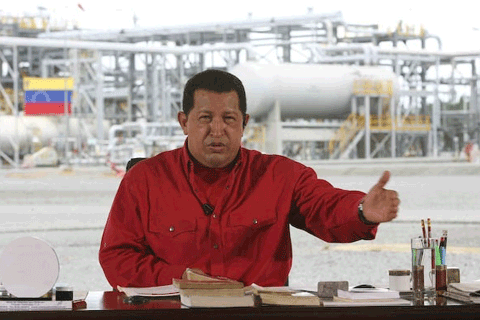Key words :
future energies,
peak oil
,heavy oil
,venezuela
,national oil companies
,hugo chavez
,expropriation
Is Venezuela the Next Flashpoint for Oil?
4 Oct, 2010 02:01 pm
In a world desperate for new oil supplies, Venezuela beckons. But will its fumbling management of oil production lead to foreign intervention, covert or otherwise, in a effort to raise Venezuelan output?
 In the days of ample oil supplies a poorly managed
nationalized oil industry or a hostile political regime just meant that
exploration companies had reason to search for oil elsewhere. Now with 88 percent
of the world's oil reserves under the control of national oil companies and
few good prospects for large finds available beyond areas controlled by such
companies, oil importing countries will be forced to rethink how they will
supply themselves with adequate quantities of oil.
In the days of ample oil supplies a poorly managed
nationalized oil industry or a hostile political regime just meant that
exploration companies had reason to search for oil elsewhere. Now with 88 percent
of the world's oil reserves under the control of national oil companies and
few good prospects for large finds available beyond areas controlled by such
companies, oil importing countries will be forced to rethink how they will
supply themselves with adequate quantities of oil.Robert Rapier recently explained the reasons behind the drop in Venezuela's oil production: failure to reinvest in new production and fear of expropriation among those companies that deal with Venezuela and its national oil company, Petróleos de Venezuela S. A. (PDVSA). Whatever one thinks of Venezuelan President Hugo Chavez's programs designed to assist the nation's poor, they have been largely paid for with oil revenues. And, he has now undermined the ability of the oil industry to fund his programs.
But that also means he is undermining Venezuela's ability to provide oil exports to importing nations. In a world awash in oil, this would merely be Venezuela's problem. But with oil supplies tight and a near-term peak in the world's rate of oil production a major risk, it's possible that oil importing countries--particularly the United States which is one of Venezuela's largest oil customers--may decide that it is necessary to solve Venezuela's problem of declining oil production for it.
I am not necessarily predicting armed conflict. But a country advertised to have 513 billion barrels of technically recoverable heavy oil alone is a tempting target for international mischief. (I'm inclined to believe that a significant portion of this heavy oil will never become economically recoverable. But in geopolitics, perception, not a careful assessment of the facts, often drives the action.)
Iraq's oil reserves proved too tempting a target early in the previous decade. The country had mismanaged its nationalized oil industry, and its unelected leader, Saddam Hussein, was reviled even in the Middle East. But Iraq proved to be a problematic conquest, and attempts to realize its untapped oil wealth continue to be frustrated by ongoing civil strife. It seems unlikely that, given the experience in Iraq, direct military intervention would appear wise in Venezuela, especially if the problem is framed as raising the country's oil production.
There are other complications as well. Unlike Saddam Hussein, Chavez was elected. There can be no claim that he somehow seized power illegitimately. And, he has friendly relations with many South and Central American regimes. An attempt to oust him in a 2002 coup engineered by the country's opposition with tacit support from the United States failed. By that time--already three years into his presidency--many elements of Venezuelan society including many in the military had grown loyal to his regime. But I would not put a second attempt out of the realm of possibility.
It is worthwhile to contrast the Chinese and Russian approach to Venezuela with that of the United States. Both China and Russia recently signed joint-venture agreements to develop heavy oil in the country. Of course, each government has its own government-run oil company. The Chinese especially seem less concerned about private property rights and making a profit and more concerned about developing Venezuela's oil to meet China's growing oil import needs. The Chinese may not make much money on their joint venture. But they will at least have speeded the development of additional oil supplies which they badly need.
U. S. policymakers, however, are hampered in this regard since oil companies under U. S. jurisdiction are not owned by the government and naturally focus on their shareholders' desire to make a profit, not on the United States' need for additional sources of imported oil. The Chavez record on expropriation makes non-government-owned oil companies leery of investing in Venezuela though some still do.
In another part of the world there is the curious and largely unnoticed case of the world's largest oil exporter, Saudi Arabia, announcing in 2008 that it will limit daily production to no more than 12.5 million barrels per day. Back then the U. S. Energy Information Administration (EIA) was still counting on the Saudis for 16.4 million barrels per day by 2030. Only four years earlier the EIA had projected 23.8 million barrels per day for the country by 2025. It's not clear that this is a case of voluntary restraint from Saudi Arabia. It may be that oil production there has run into a wall and cannot rise. Is the hands-off attitude toward Saudi Arabia a tacit recognition that the country cannot pump any more oil than it currently does? No one can be sure.
Still, the need for additional oil supplies seems likely to lead to pressure on Venezuela to raise its production. Actually, President Hugo Chavez says that this is what he wants to do. The problem isn't intent, then, but execution. Perhaps powers such as the United States will decide that someone else at the head of the Venezuelan government will be better able to bring that increase to fruition--if only Chavez can be removed from the presidential palace through the electoral process or otherwise.
Key words :
future energies,
peak oil
,heavy oil
,venezuela
,national oil companies
,hugo chavez
,expropriation
-
12/12/12
Peak Oil is Nonsense Because Theres Enough Gas to Last 250 Years.
-
05/09/12
Threat of Population Surge to "10 Billion" Espoused in London Theatre.
-
05/09/12
Current Commentary: Energy from Nuclear Fusion Realities, Prospects and Fantasies?
-
04/05/12
The Oil Industry's Deceitful Promise of American Energy Independence
-
14/02/12
Shaky Foundations for Offshore Wind Farms







 Read more
Read more